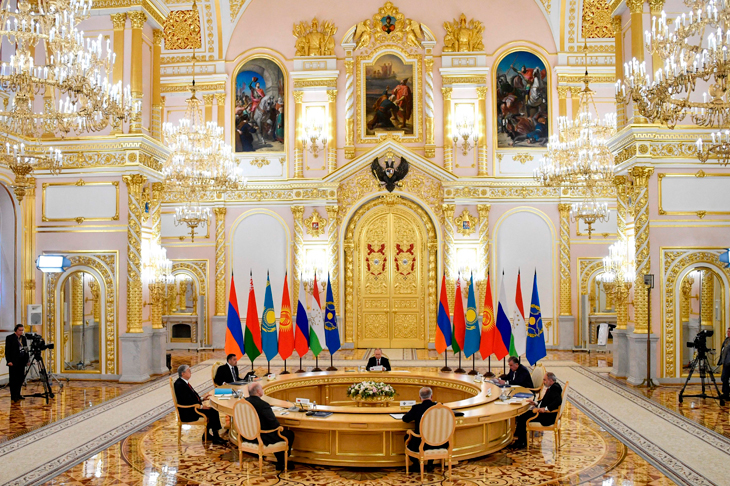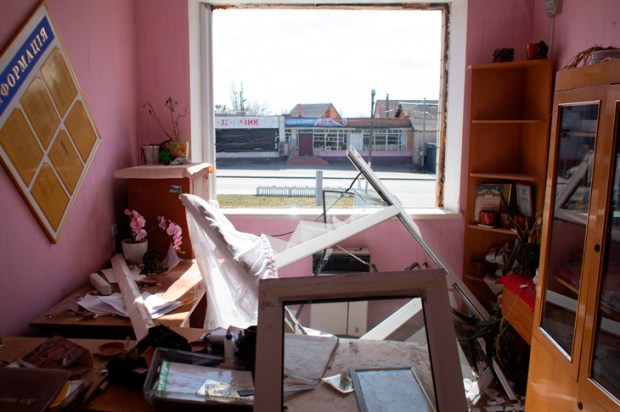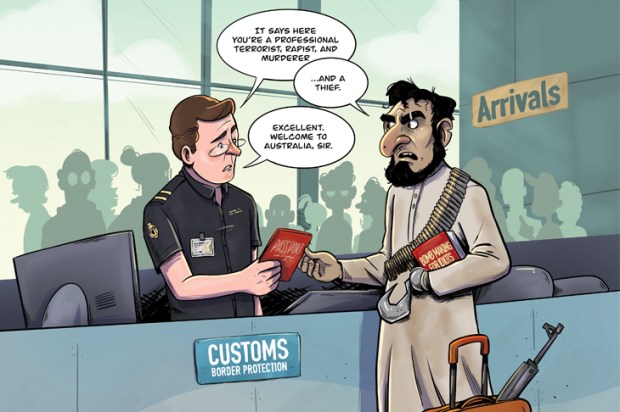According to a Nordic joke, a Finn and a Swede get together for a drinking session. The Swede says ‘Cheers’. To which the Finn replies ‘Are we here to talk? Or to drink?’. The tough, no-nonsense Finnish character – famously shown when, against overwhelming odds, they caused huge losses to Stalin’s invading forces in 1939 – was again on display when Finland’s President Niinistö was asked how he would explain to Putin why his country wanted to join Nato. ‘You caused this’, he said he would say, ‘look in the mirror.’
The last time Sweden was a member of a military alliance, Lachlan Macquarie was governor of New South Wales. Finland’s non-alignment is newer, dating from when Ben Chifley was in the Lodge. The decision by both countries to jettison their long neutrality is yet another spectacular failure from Putin, whose central stated war aim was to stop Nato enlarging towards Russia. Instead, he’s single-handedly breathed new life into Nato, is set to turn the Baltic Sea into a Nato lake and to more than double the length of the Nato-Russia border.
As Niinistö made clear, Putin’s brutal, unprovoked attack on Ukraine was the factor that shifted public opinion toward wanting Nato membership. In Finland, opinion polls on support for joining Nato have shifted from 28 per cent before Putin’s invasion to 76 per cent. In Sweden, support surged from 37 to 57 per cent. Nato, already the most powerful alliance the world has seen, will be further strengthened by the two new Nordic members. Both countries have impressive land, air and sea capabilities, know Russia and its ways intimately and are already highly integrated into Nato.
This is just the latest catastrophe for Putin in his second Ukraine war. His initial objective of ‘deNazifying’, disarming and securing control of Ukraine quickly stalled with the fierce defence of Kyiv. And his reduced objective of extending control of eastern Ukraine hasn’t gone much better – even if Moscow now controls the wreckage of Mariupol, thus connecting the largely Russian-controlled Donbas and Crimea. After nearly three months, Putin’s forces have now secured a grand total of two Ukrainian cities. The price they’ve paid, according to British intelligence, is the loss (killed, injured or missing) of one third of the 180,000-strong invasion force. Meanwhile the Ukrainians have driven the Russians back from around Ukraine’s second city, Kharkiv, and are frustrating their attempts to advance elsewhere. Western arms flooding in – with a further US$40 billion worth from the US on the way – should sustain Ukrainian momentum, including the possible liberation of further Russian-occupied territory. Nato’s Secretary General has raised the possibility that Ukraine may even win the war.
Putin seems rattled by his humiliation by Sweden and Finland, both of which are led by Social-Democrat women prime ministers whom his propaganda machine finds tricky to demonise. After initially telling the Finnish president that his country joining Nato would be ‘a mistake’ – after which Russian electricity supplies to Finland were cut off – Putin changed tack and said Nato membership by Sweden and Finland caused ‘no problems’ for Russia, unless the alliance moved additional weaponry onto their territory. Bad cop Putin then swiftly returned, with reports of Russia moving nuclear-capable missiles close to the Finnish border.
The Nordics’ Nato move has also wrong-footed French President Macron and his efforts to bolster joint EU defence efforts at the expense of Nato – which he’s nonsensically described as ‘brain dead’. The EU involves mutual defence commitments, but Sweden and Finland, both members, have shown how seriously they take those. Macron is markedly less hawkish than Ukraine’s strongest supporters – Poland, the Baltic States, the Nordics, the US and Britain – who openly want Russia defeated and are prepared to do everything short of entering the war to help the Ukrainians achieve that. He persists in his communication with Putin, which the Estonians and Poles, among others, openly criticise for undermining the message that Putin’s actions make him an isolated pariah. Macron says he doesn’t want Putin humiliated and President Zelensky has suggested that he’s come under French pressure to make territorial concessions to help Putin save face. Paris denies the claims. But it’s striking that Macron, unlike other Western leaders, hasn’t visited Ukraine since Russia’s invasion. Macron also calls repeatedly for a ceasefire, but not Russia’s military withdrawal. German Chancellor Scholz has been another no-show in Ukraine and seems to be co-ordinating talking points with Macron. Although his government has exceeded expectations on Ukraine – in-principle lifting the ban on transfers of weaponry, getting serious about German defence expenditure, blocking operation of the Nord-Stream 2 gas pipeline and going along with an EU embargo on Russian oil – it seems to be slipping back into pacifist habits. When Scholz finally agreed to sell anti-aircraft tanks to Ukraine, it emerged that the deal wouldn’t include ammunition. There was a widespread feeling that there was justice not only in Ukraine winning this year’s Eurovision song contest, but in France and Germany coming last.
The strong popular Eurovision vote for Ukraine underlined the huge level of support for the country among ordinary Europeans. But, even though Russia’s actions are a clear-cut case of unprovoked aggression and barbarism surpassing any horror in Europe since Hitler’s war, big anti-war demonstrations on the scale of those against the invasion of Iraq or the BLM rallies are nowhere to be seen. The West’s anti-war demonstrating classes only get out on the streets to protest, it seems, against the perceived outrages of the Anglosphere and Israel.
Nato’s post-Cold War enlargement has received surprising amounts of criticism from some Western commentators. This is irrational. Appeasing Moscow’s sensitivities by refusing Nato membership to former captive nations whose escape from Russian tyranny Putin hasn’t accepted would have diminished European security – imagine the current risks for the Baltic States or Poland if they weren’t in the Nato club. Blocking their entry would also have betrayed what should be Western values of solidarity with fellow democracies. Yet even the normally sensible Greg Sheridan recently described Nato’s expansion as ‘ill-advised’. Will he and others counsel that Nato should reject Finland’s and Sweden’s membership applications? That would be equivalent to arguing Australia should abandon its alliance with the US to appease China.
Got something to add? Join the discussion and comment below.
Get 10 issues for just $10
Subscribe to The Spectator Australia today for the next 10 magazine issues, plus full online access, for just $10.
Mark Higgie is on Twitter at @markhiggie1
You might disagree with half of it, but you’ll enjoy reading all of it. Try your first month for free, then just $2 a week for the remainder of your first year.














Comments
Don't miss out
Join the conversation with other Spectator Australia readers. Subscribe to leave a comment.
SUBSCRIBEAlready a subscriber? Log in